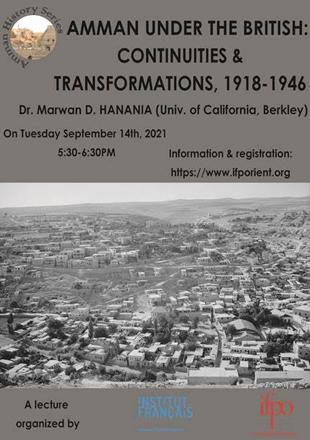You are here
Great Arab Revolt is cornerstone of Jordan’s political legitimacy — US scholar
By Saeb Rawashdeh - May 25,2017 - Last updated at May 25,2017
AMMAN — The Great Arab Revolt is the cornerstone of Jordan’s political legitimacy, according to an Oxford University professor.
During a lecture titled“Between Ottomanism and Arabism: Jordan in the First World War” held at The British Council last Wednesday, Eugene Rogan presented his views about the region’s history during the turbulent times of the collapse of the Ottoman Empire and the First World War.
Rogan, who has written “The Arabs: a History” and “The Fall of the Ottomans: The Great War in the Middle East, 1914-1920”, used Ottoman documents and memoirs of local contemporaries of these events to contextualise the Great Arab Revolt and its impact on the townspeople and tribes of Ottoman Transjordan.
The event was organised by the Institut français du Proche-Orient and the Council for British Research in the Levant, in collaboration with the British Council and the Council for International Educational Exchange.
“The Kingdom went to great lengths to celebrate the centenary of the revolt in 2016,” the expert said, adding that, yet, “the Arab revolt placed great strain on Arab society one century ago, and nowhere more so than in the lands that became Jordan”.
The Ottoman Empire had established direct rule in Ajloun District in 1851, in Balqa region in 1867 and in Karak in 1893, the historian noted, while it encouraged settlements of Circassians, Chechens and Turkomans, all loyal to Ottoman rule, while also boosting agriculture among rural communities.
“Many Arab men had served in disastrous Balkan wars in 1912 to 1913 and had no wish to face conscription all over again,” Rogan underlined, adding that ”they could see no reason for Ottomans to enter the war between European powers and wanted to avoid the conflict with powerful European states.”
The Christians of Jordan also suffered persecution from the Ottoman government, as it saw them as a potential fifth column because of the links between the Latin community and France, the Protestant community and Britain, and the Orthodox community and Russia, the historian explained.
On the other hand, Muslim Arabs fell into two categories: the loyalists enjoyed Ottoman promotion and favours, but those who sympathised with Arabism faced the same consequences as Christian Arabs, Rogan pointed out.
One of the first things Ottoman authorities did after the outbreak of the First World War was to seize archives of British, French and Russian consulates for any intelligence information they may have contained, he said.
Jamal Pasha, who was in charge of Greater Syria within the Ottoman Empire, thought that Arabists were a marginal political movement, according to the scholar.
During the failed Sinai campaign against British troops in March 1915, the Hashemites were “notably absent” and the Ottoman failure raised doubts about the future of the empire, Rogan said.
“Very soon after the public hangings of Arab nationalists in Beirut and Damascus on June 10,1916, the Hashemites began the revolt, capturing Jeddah and Mecca by the end of September,” the historian noted, adding that news of the Arab revolt ignited heated debates among Arab officers in the Ottoman army.
Rogan continued: “However, many Arab officers preferred to remain with the reformed Ottoman Empire and achieve a dual Turkish-Arab empire similar to the Austro-Hungarian Empire.”
After initial successes in the opening weeks of the Arab Revolt, by late autumn 1916 there was a risk that the professional Ottoman army may overwhelm the largely irregular Arab armies, the scholar noted, saying that in order to compromise with Muslim subjects of the empire who were against sending non-Muslim British troops to Hijaz, the British Empire decided to boost the Hashemite armies with Arab Ottoman officers captured in Libya, Egypt and Mesopotamia.
“The Arab Revolt came to Jordan in July 1917, when Arab forces took Aqaba, which was a strategic gain enabling connection between Arab armies and the British in Sinai; since the fall of Aqaba, the main frontier of the Arab Revolt shifted from Hijaz to the southern frontier of Syria,” Rogan underlined.
The Arab army stormed Daraa in Syria on September 26 and 27 1918 and the next day was joined by Allenby’s Egyptian expeditionary forces and continued to Damascus with ANZAC and Indian cavalry, cutting the Ottoman lines of retreat towards Beirut and Homs. Damascus fell to Sharif Nasser on September 30, 1918, according to the expert .
“The legacy of the Arab Revolt in Transjordan has been more divisive than our history books have suggested,” Rogan said, emphasising that “nationalism was a quite alien ideology to bedouin tribes”.
“The Ottomans, through fear and favour, were far more effective in cultivating loyalties than what we gave them credit for in the past,” the scholar explained.
After four centuries of rule in the Arab world, the “Ottomans were the devil people knew”, while the Great War made people in Transjordan greatly cautious, the scholar emphasised.
The vast majority was anxious and undecided during the war, waiting to side with the ultimate winner, he said.
“One century later, the Hashemite Kingdom of Jordan stands as a last surviving vestige of that movement, its success — the testament to high hopes of the framers of the Arab Revolt,” Rogan concluded.
Related Articles
AMMAN — While southern Jordan witnesses an abundance of ancient sites, a British archaeologist decided to study the 20th century archaeology
AMMAN — Jordan Television is broadcasting a three-part documentary on the Great Arab Revolt on September 16th, 17th and 18th.The docum
AMMAN — Transjordan and Amman were formed as ethnically diverse communities of professionals with ties to outside, according to a Jordanian


















